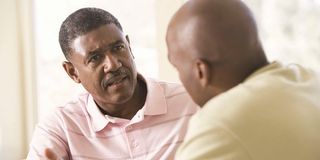Let’s approach fathers’ flaws openly and compassionately

Admitting that our fathers aren't perfect is no easy feat for any child.
What you need to know:
- When celebrated author Ngugi wa Thiong'o's son, Mukoma wa Ngugi, recently accused him of physically abusing his mother, on X, it sparked negative feedback offline and online.
- Mukoma's subsequent characterisation of the backlash as “patriarchal cancer” aptly summed it up.
- However, some Kenyans publicly fought for Mukoma’s right to address his trauma as he saw fit, and I stand with them.
Our fathers are human—just as fallible as anyone else. It may seem like an obvious truth, but it's often challenging to accept their mistakes, even though doing so is part of honouring their humanity.
When celebrated author Ngugi wa Thiong'o's son, Mukoma wa Ngugi, recently accused his father of physically abusing his mother on X, it sparked a barrage of negative feedback offline and online.
Mukoma's subsequent characterisation of the backlash as “patriarchal cancer” aptly summed it up. However, some Kenyans publicly fought for Mukoma’s right to address his trauma as he saw fit, and I stand with them.
Admitting that our fathers aren't perfect is no easy feat for any child. Moreover, patriarchal societies, where fathers are demigods, are particularly unforgiving when it comes to discussing paternal weaknesses.
Now imagine how doubly hard it must be when your dad is a highly decorated literary figure. I still remember the first time my father disappointed me. I was only seven. He had promised us a trip to the supermarket, but he never showed up.
My siblings and I dressed and waited by the window for hours on that rainy day. Our eyes were glued to the gate for a sign of his car, but he never showed up.
We cried ourselves to numbness. It was difficult to reconcile the image of our father as both a hero and a villain who caused us unimaginable pain. It’s not becoming easier to do that, even as an adult.
Also read: Do men inevitably turn into their dads?
There were other instances of disappointment, like when he took on a second wife or when he abused our mother. These were soul-crushing moments, but in retrospect, they didn't diminish my love for him.
In the same way, my teenage transgressions did not diminish his love for me. He remained the father who provided for us, protected us, and taught me how to draw a fish.
My therapist once advised me to separate my father's identities—as a parent and as a spouse. I learned to recognise my social contract with him as a daughter, distinct from his relationship with my mother.
These words helped me heal some of my childhood wounds. As writer and wellness advocate Josefina Sanders reminds us, healing cannot occur if we hide from, ignore, or cover our pain.
Also read: The kind of father I would like to be
In Devil on the Cross, Ngugi wa Thiong'o writes: “Our lives are a battlefield on which is fought a continuous war between the forces that are pledged to confirm our humanity and those determined to dismantle it; those who strive to build a protective wall around it, and those who wish to pull it down; those who seek to mould it and those committed to breaking it up.”
May we all find comfort and healing in fighting for humanity.
The writer comments on social and gender topics (@FaithOneya; [email protected]).





